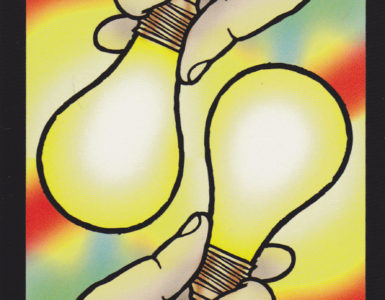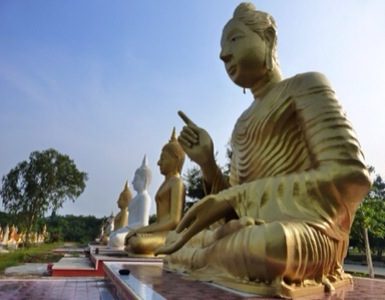The God of my childhood was, essentially, Santa Claus. He knew when you were sleeping. He knew when you were awake. He knew when you’d been bad or good — and you’d better be good, for goodness sake, because bad kids would be dumped into a lake of fire to flayed alive for all eternity.
The God of my twenties was, essentially, The Blind Watchmaker — Richard Dawkins’ clever name for the insensate forces of natural selection. I believed that the universe arose from nothing more than the interplay of forces set in motion billions of years ago. (And I ignored, as every good atheist must, the question of what set those forces in motion in the first place.)
In my thirties, I realized that switching from religion to rationalism amounted to little more than swapping one brand of fundamentalism for another. So I set out to fashion my own faith from bits and pieces of different traditions: some Buddhism here, some Western mysticism there, with a little Christianity thrown in for good measure. The spiritual path I pieced together worked well enough … but, in the end, it was a lonesome road to travel.
So, out of a desire for community, by the time I was forty, I had turned to the Methodist church. I liked the couples-focused Sunday School at the congregation near my home, and I found the church’s emphasis on social justice and inclusion appealing. We made good friends there, and, for a long time, I felt at home at Peachtree and 5th.
And then, things changed. The services I once enjoyed stopped speaking to me; during them, I no longer felt a connection to the Divine. As attendance continued to dwindle, few members proved willing to make the hard choices needed to restore the congregation’s former vibrance. And, worse, despite the liberal attitudes of the locals, the Mother Church continues to preach acceptance while practicing bigotry. It’s hard to give my whole-hearted support to an organization that classifies me as a second-class Child of God.
My own beliefs were changing, too, and I felt dishonest passing myself off as a Methodist while rejecting many of that church’s core beliefs. I’ve invested too much energy coming out of closets to go back into a spiritual one.
So, once again, I find myself “on the road” — wondering and wandering, struggling to define what I really believe, and looking for community where I can feel safe, supported, and inspired.
For now, I’ve landed at the Spiritual Living Center of Atlanta. The teaching here echoes many of my own beliefs. The music inspires me.
As a community, the folks at the Center are a bit chillier than I’d like. I’ve attended services almost every Sunday for three months, and I can count the times someone has spoken to me on one hand. (They do invite newcomers to introduce themselves to the staff; to be fair, I still haven’t done this. It’s also true there’s something to be said for allowing people to *be* without *being approached*.)
It’s fine for now. In the meantime, I’m reading the book the Center’s teachings are based on — Ernest Holmes’ The Science of Mind — and trying to decide if this really is the place for me. As I find out what’s up, I’ll share it here. In the meantime, if you’re part of a spiritual community in the Atlanta metro area that welcomes seekers and long-term couples and People Like Me, drop me a line. I’m open to suggestions!





Add comment